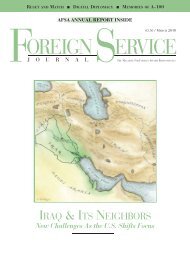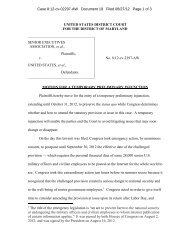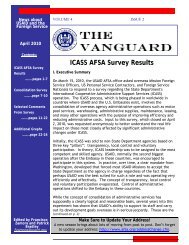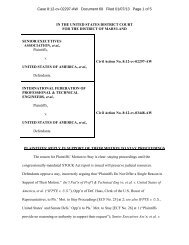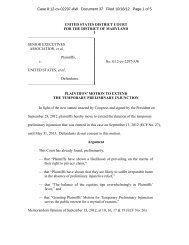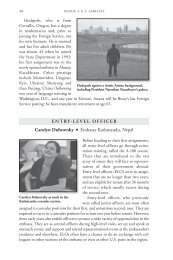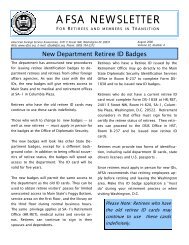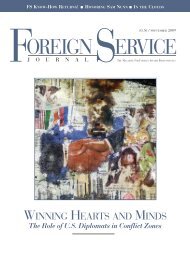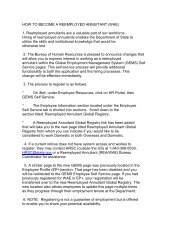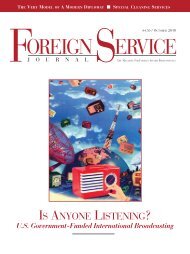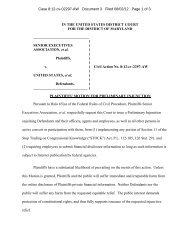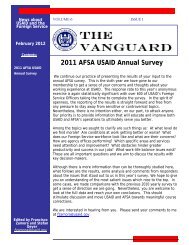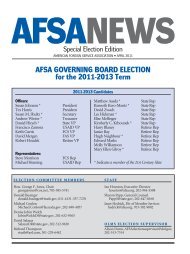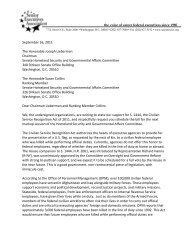F OCUS - American Foreign Service Association
F OCUS - American Foreign Service Association
F OCUS - American Foreign Service Association
Create successful ePaper yourself
Turn your PDF publications into a flip-book with our unique Google optimized e-Paper software.
LETTERS<br />
Progress on Contact<br />
Reporting Requirements<br />
I am pleased to report an update to<br />
the information contained in my March<br />
Speaking Out (“Twelve Recommendations<br />
to Improve the Security Clearance<br />
Process”). On Feb. 12, after the<br />
Journal had already gone to print, the<br />
Bureau of Diplomatic Security published<br />
new contact reporting requirements<br />
(12 FAM 262 and 270). However,<br />
the larger questions I highlighted<br />
in my piece about how DS handles security<br />
clearance cases remain pertinent.<br />
Daniel M. Hirsch<br />
FSO<br />
Silver Spring, Md.<br />
A Clarification<br />
The <strong>Foreign</strong> <strong>Service</strong> Journal carried<br />
my account of a Moscow confrontation<br />
as the February Reflections column. I<br />
was gratified at the opportunity to illustrate<br />
the courage, skill and “cool” of<br />
one of our greatest career diplomats,<br />
Llewellyn Thompson. However, I<br />
would like to clarify a point that was inadvertently<br />
distorted in the course of<br />
editing.<br />
When I commented that “In retrospect,<br />
it probably was as close to World<br />
War III as we came,” I was referring to<br />
the entire Berlin Crisis of 1958-1962<br />
and the attendant Cuban Missile Crisis<br />
— not our single meeting on Jan. 13,<br />
1961.<br />
I would also like to note that the<br />
piece was excerpted from the introduction<br />
to my memoirs, Cold War<br />
Saga, which is scheduled to be published<br />
in the spring of 2010.<br />
Kempton Jenkins<br />
FSO, retired<br />
Bethesda, Md.<br />
Ingredients for Change<br />
The February issue of the Journal<br />
contained three items that deserve<br />
careful attention. They constitute an<br />
unorchestrated — and all the more<br />
compelling for that reason — call for<br />
greater creativity and wave-making.<br />
John Naland’s President’s Views column<br />
raises two especially important<br />
and related points. The first is the<br />
need for members of the <strong>Foreign</strong><br />
<strong>Service</strong> to do more professional writing,<br />
“provocative essays by active-duty<br />
officers analyzing professional issues”<br />
of the kind that fill the many military<br />
journals. The second is the steady decline<br />
in nominations for AFSA’s constructive<br />
dissent awards, the only ones<br />
of their kind in the U.S. government,<br />
which recognize employees for their<br />
neck-on-the-block courage in challenging<br />
policies or management practices.<br />
In Letters, retired Ambassador Ed<br />
Marks offers a number of thoughtful<br />
suggestions to strengthen that faltering<br />
dissent awards program. Two of them<br />
that make a great deal of sense, and are<br />
also mutually reinforcing, concern generating<br />
more awareness of that unique<br />
program, as well as greater recognition<br />
for the winners, by providing more extensive<br />
recognition inside the Journal,<br />
and placing their photographs on the<br />
cover.<br />
Then retired Ambassador David<br />
Passage takes on the Defense Department<br />
in a thoughtful and informed<br />
Speaking Out column presenting the<br />
rationale for doing away with AFRI-<br />
COM and SOUTHCOM, which he<br />
describes as “Reliquaria from an Earlier<br />
Age.” Few FSOs know as much<br />
about working with, and the workings<br />
of, DOD and that massive organization’s<br />
involvement with foreign policy<br />
as he does, and the case he makes merits<br />
close study. Amb. Passage is doing<br />
just what Naland suggests, and his proposals<br />
could earn him a dissent nomination<br />
(if he were still on active duty<br />
and — a firm requirement — if he had<br />
not gone public).<br />
There is a great deal happening in<br />
foreign affairs currently, much of it focused<br />
on significantly expanding the<br />
size and strengthening the role of State<br />
and the <strong>Foreign</strong> <strong>Service</strong>. A requirement<br />
for success in taking on this increased<br />
role is to improve the manner<br />
in which the work is performed. More<br />
professionalism, improved communications<br />
and a greater willingness to<br />
take up the cudgels, in the broadest<br />
sense, are important ingredients for<br />
such a change.<br />
Ed Peck<br />
Ambassador, retired<br />
Chevy Chase, Md.<br />
6 F O R E I G N S E R V I C E J O U R N A L / A P R I L 2 0 0 9



